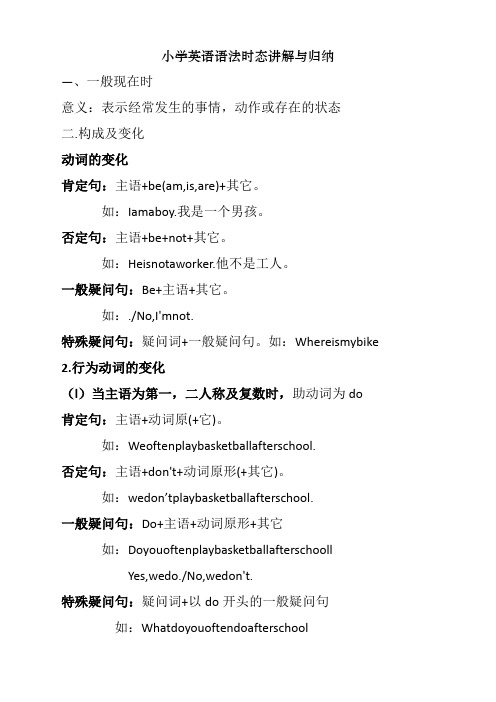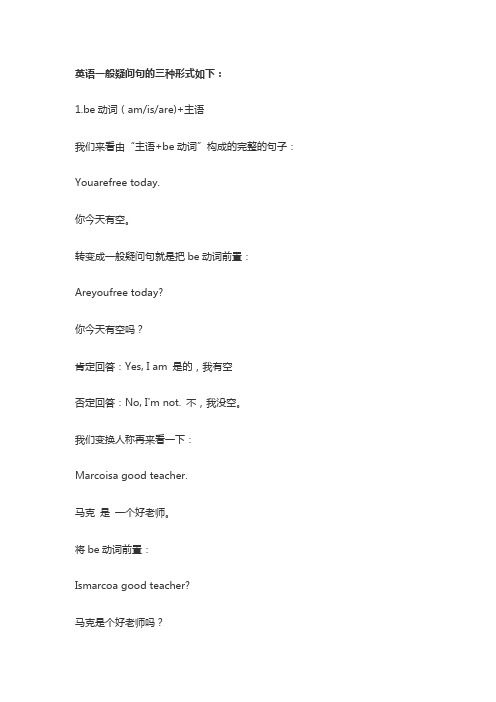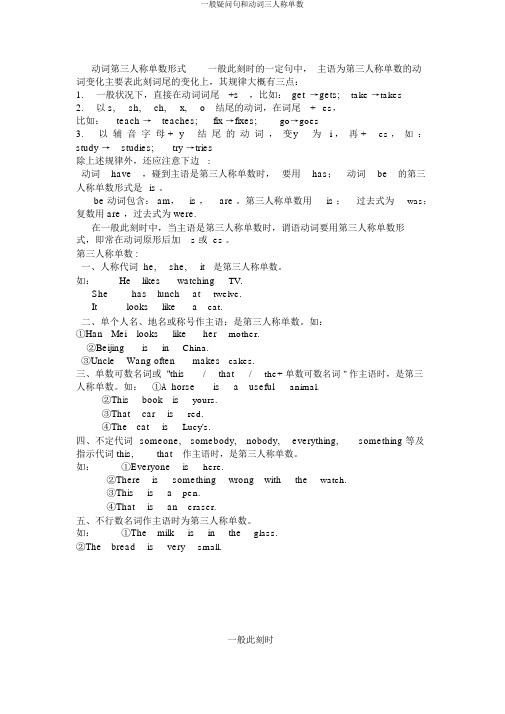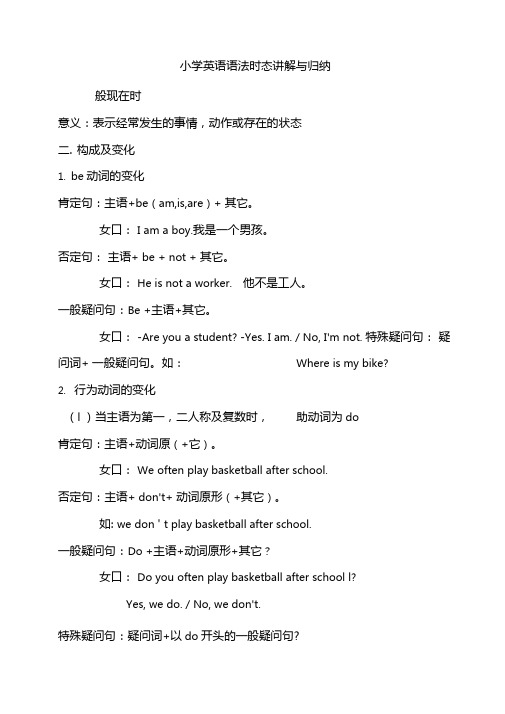一般疑问句和动词三人称单数1
六年级英语上册Unit 4 I have a pen pal (语法)第三人称单数+一般疑问句

1.午休 2.抄三单、一般疑问句笔记 1遍
3.背笔记
4.预习 P41
—Does he live on a farm ? —(肯) Yes, he does. (否) No, he does n't not .
否定缩写
is not =
can not do not
= = does not =
not is n't can’t
don’t doesn’t
作肯定/否定回答。
does (do) homework at school. 三单 7. He usually _____ like (like) eating noodles. 一复 8. We _____
三复 9. Wu Yifan and Robin _____ read (read) a poem. 三单 10. Peter sometimes ________ watches (watch) TV.
改成一般疑问句。
1. He lives on a farm. 2. I can sing English songs.
Does he live on a farm ?
1.情态动词 2.be动词 (am/is/are) 3.若无,加助动 词do/does/did
3. Zhang Peng is helpful at home.
三单 4. She usually _____ takes (take) the No.1 bus.
二 5. You ____ get (get) up early every day.
用单词的适当形式填空。
三单 6. Amy _______ studies (study) hard.
英语动词时态 一般现在时 第三人称单数形式

一般现在时态概念表示经常、反复、习惯性的动作或行为,也表示现存状况或客观真理。
结构主语+be动词、行为动词等句型I)当主语是第三人称单数时(he /she /it)肯定句单三主语+单三谓语+……He likes English.否定句单三主语+doesn't + 动词原形+……He doesn't likes English. 一般疑问句Does + 单三主语+ 动词原形+…… ?Does he likes English?肯定回答Yes , 单三主语+does Y es , he does.否定回答No , 单三主语+doesn't No , he doesn't.特殊疑问句疑问词+ 一般疑问句What does he like?特殊疑问句回答整句或关键词He likes English.II)当主语是其他人称时(I /we /you /you /they) 肯定句其他主语+ 动词原形+……They like English.否定句其他主语+don't + 动词原形+……They don't likes English. 一般疑问句Do + 其他主语+ 动词原形+……?Do they like English?肯定回答Yes , 其他主语+ do Y es , they do.否定回答No , 其他主语+ don't No , they don't.特殊疑问句疑问词+ 一般疑问句What do they like?特殊疑问句回答整句或关键词They like English.概念表示现在正在进行的动作或行为。
结构be动词+现在分词句型肯定句主语+be+现在分词+……He is reading English.否定句主语+be not +现在分词+……He isn't reading English.一般疑问句Be + 主语+现在分词+……? Is he reading English?肯定回答Yes , 主语+be Y es , he is.否定回答No , 主语+be not No , he isn't.特殊疑问句疑问词+ 一般疑问句What is reading?特殊疑问句回答整句或关键词He is reading English. /English.概念表示将来某个时间将要发生的动作或存在的状态,也表示将来经常或重复发生的动作。
动词第三人称单数形式构成规则

般现在时动词第三人称单数形式构成规则(一般现在时中主语时第三人称1大多数动词在词尾加“S”如:①stop —stops make —makes read —reads play —plays [z]2、以辅音字母加“ y”结尾的,要先将“ y”变为“ i ”,然后在加“ es”读[iz]女口:fly —flies carry —carries study —studies worry —worries3、以“ s, x, ch, sh ”结尾的,在词尾加“ es”,发音为如:teach —teaches watch —watches4、以“ o”结尾的动词,加“ es”,如:go —goes do —does5、以不发音字母“ e”结尾的开音节词,加“s ”女口:close —closes [iz]6、be 动词包括:am,is ,are 。
第三人称单数用is ;过去式为was ;复数用are ,过去式为were.1. 动词have ,遇到主语是第三人称单数时,要用has ;动词be 的第三人称单数形式是is 。
2. 含有动词第三人称单数形式的句子变否定句时,要用doesn't + 动词原形,如:He goes to school at six in the morning.(变否定句)He does n't go to schoolat six in the morning.3. 对含有动词第三人称单数形式的句子提问时,要用助动词does,如:She goes home at five every day.(对划线部分提问)When / What time does shego home every day?般现在时中的第三人称单数形式在一般现在时中,当主语是第三人称单数时,谓语动词要用第三人称单数形式,原形后加即常在动词-s 或-es 。
I 什么是一般现在时?一般现在时的基本用法有哪些呢?No. 1 】一般现在时的功能1. 表示事物或人物的特征、状态。
名词,动词三单和人称代词变化规则

一、名词复数规则1.一般情况下,直接加-s,如:book-books, bag-bags, cat-cats, bed-beds 2.以s。
x。
sh。
ch结尾,加-es,如:bus-buses, box-boxes, brush-brushes,watch-watches3.以“辅音字母+y”结尾,变y为i,再加-es,如:family-families,strawberry-strawberries 4.以“f或fe”结尾,变f或fe为v,再加-es,如:knife-knives Leaf--leaves5.不规则名词复数:man-men,woman-women,policeman-policemen,policewoman-policewomen, child-children foot-feet,tooth-teeth6.复数不发生变化的fish-fish, people-people, Chinese-Chinese二.动词三单一.动词三单的变化规则1.一般情况下,直接加-s,如:cook-cooks, milk-milks2.以s。
x。
sh。
ch。
o结尾,加-es,如:guess-guesses, wash-washes, watch-watches,go-goes3.以“辅音字母+y”结尾,变y为i,再加-es,如:study-studies三.be动词Be 动词的用法:口诀:我用am,你用are,三单is,复数are(2)肯定和否定句 I am (not) from London。
He is(not) a teacher。
She is(not)in the dining room。
My hair is(not) long。
Her eyes are(not) small。
(3)一般疑问句 Am I a Chinese? Yes, you are。
No, you aren’t。
一般现在时第三人称单数、疑问句

小学英语语法时态讲解与归纳—、一般现在时意义:表示经常发生的事情,动作或存在的状态二.构成及变化动词的变化肯定句:主语+be(am,is,are)+其它。
如:Iamaboy.我是一个男孩。
否定句:主语+be+not+其它。
如:Heisnotaworker.他不是工人。
一般疑问句:Be+主语+其它。
如:./No,I'mnot.特殊疑问句:疑问词+一般疑问句。
如:Whereismybike 2.行为动词的变化(l)当主语为第一,二人称及复数时,助动词为do肯定句:主语+动词原(+它)。
如:Weoftenplaybasketballafterschool.否定句:主语+don't+动词原形(+其它)。
如:wedon’tplaybasketballafterschool.一般疑问句:Do+主语+动词原形+其它如:DoyouoftenplaybasketballafterschoollYes,wedo./No,wedon't.特殊疑问句:疑问词+以do开头的一般疑问句如:Whatdoyouoftendoafterschool(2)当主语为第三人称单数时,助动词为does肯定句:主语+动词三单式(+其它)。
如:Heswimswell.否定句:主语+doesn’t+动词原形(+其它)。
如:Hedoesn’tswim well.一般疑问句:Does+主语+动词原形+其它。
如:DoesheswimwellYes,hedoes./No,hedoesn't.特殊疑问句:疑问词+以does开头的一般疑问句如:Howdoesyourfathergotowork三.第三人称单数的动词变化规则(只有在第三人称为主语的肯定句中,动词才用三单式)(1)多数动词直接加s:runs getslikescolletstakesplays climbs…….(2)结尾是s,x,sh,ch,o,前为辅音字母,结尾加es:watches teaches goes does washes crossesmixes brushes(3)动词末尾y前为辅音:将y改为i加es:study→studiesfly→fliescarry→carriescry→cries但在y前如果为元音则直接加s:buyssays四.时间标志:always,usually,often,so metimes,every…一般现在时练习Heoften (have)dinnerathome. DanielandTommy (be)inClassOne.We (notwatch)TVonMonday.Nick (notgo)tothezooonSunday.they (like)theWorldCupWhattheyoften (do)onSaturdaysyourparents(read)newspaperseverydayThegirl (teach)usEnglishonSundays.SheandI(take)awalktogethereveryevening.There(be)somewaterinthebottle.Mike____(like)cooking.They____ (have)thesamehobby.Myaunt____(look)afterherbabycarefully. Youalways______(do)yourhomeworkwell.I (be)’mstayinginbed.She (go)toschoolfromMondaytoFriday.LiuTao_____(do)notlikePE.Thechildoften_____(watch)TVintheevening. SuHaiandSuYang____(have)eightlessonsthisterm.-Whatday___(be)ittoday-It’sSaturdayWinter, spring, summer and autumn (be)seasons.Danny (take) off his T-shirt now.Today (teach) a science lesson.Jenny and I (live) in Canada.Jenny (want) to go to school in chinaLet me (help) youShe eats a sandwich(总是)Li Ming goes to school by bicycle(有时)。
英语一般疑问句的三种形式

英语一般疑问句的三种形式如下:1.be动词(am/is/are)+主语我们来看由“主语+be动词”构成的完整的句子:Youarefree today.你今天有空。
转变成一般疑问句就是把be动词前置:Areyoufree today?你今天有空吗?肯定回答:Yes, I am 是的,我有空否定回答:No, I'm not. 不,我没空。
我们变换人称再来看一下:Marcoisa good teacher.马克是一个好老师。
将be动词前置:Ismarcoa good teacher?马克是个好老师吗?肯定回答:Yes, he is. 他是否定回答:Nno, he isn't . 不,他不是。
第三人称复数也是一样的变法:Theyare outside the room.他们在房间外面。
Aretheyoutside the room?肯定回答:Yes, they are. 是的。
否定回答:No, they aren't.不是,他们没有在外头。
2.助动词+主语首先我们来看一下助动词都有哪些:will,can,may,must,should,would,could Icanhelp you.我可以帮助你。
转换成一般疑问句,同样是助动词前置:canIhelp you?你可以帮助我吗?肯定回答:Yes, I can. 我可以。
否定回答:No,I can't. 我不可以。
其他人称也是一样的方法:Wemustbe quiet in the classroom.我们必须保持在教室里要安静。
Mustwebe quiet in the classroom?我们必须在教室里保持安静吗?3."动词do/does+动词原形+主语第三种情况“主语+动词”是最特殊的,因为不再是把动词前置,而是要按主语的人称分别使用助动词do或者does,原有的动词一律变成原形。
我们来看一个例子:Marcostudieshard.马克学习刻苦。
一般疑问句和动词三人称单数

动词第三人称单数形式一般此刻时的一定句中,主语为第三人称单数的动词变化主要表此刻词尾的变化上,其规律大概有三点:1. 一般状况下,直接在动词词尾+s,比如:get→gets;take →takes2. 以 s, sh, ch, x, o结尾的动词,在词尾+es,比如:teach →teaches;fix →fixes;go→goes3.以辅音字母 + y结尾的动词,变y为i ,再 +es ,如:study →studies;try →tries除上述规律外,还应注意下边:动词have,碰到主语是第三人称单数时,要用has;动词be的第三人称单数形式是is 。
be 动词包含: am,is ,are 。
第三人称单数用is ;过去式为was;复数用 are ,过去式为 were.在一般此刻时中,当主语是第三人称单数时,谓语动词要用第三人称单数形式,即常在动词原形后加-s 或 -es 。
第三人称单数 :一、人称代词 he, she, it是第三人称单数。
如:He likes watching TV.She has lunch at twelve.It looks like a cat.二、单个人名、地名或称号作主语;是第三人称单数。
如:①Han Mei looks like her mother.②Beijing is in China.③Uncle Wang often makes cakes.三、单数可数名词或 "this/ that/the+ 单数可数名词 " 作主语时,是第三人称单数。
如:①A horse is a useful animal.②This book is yours.③That car is red.④The cat is Lucy's.四、不定代词someone, somebody, nobody, everything,something 等及指示代词 this,that作主语时,是第三人称单数。
一般现在时第三人称单数,疑问句

小学英语语法时态讲解与归纳般现在时意义:表示经常发生的事情,动作或存在的状态二.构成及变化1.be动词的变化肯定句:主语+be(am,is,are)+ 其它。
女口:I am a boy.我是一个男孩。
否定句:主语+ be + not + 其它。
女口:He is not a worker. 他不是工人。
一般疑问句:Be +主语+其它。
女口:-Are you a student? -Yes. I am. / No, I'm not. 特殊疑问句:疑问词+ 一般疑问句。
如:Where is my bike?2.行为动词的变化(l )当主语为第一,二人称及复数时,助动词为do肯定句:主语+动词原(+它)。
女口:We often play basketball after school.否定句:主语+ don't+ 动词原形(+其它)。
如: we don ' t play basketball after school.一般疑问句:Do +主语+动词原形+其它?女口:Do you often play basketball after school l?Yes, we do. / No, we don't.特殊疑问句:疑问词+以do开头的一般疑问句?女口:What do you often do after school ?(2)当主语为第三人称单数时,助动词为does肯定句:主语+动词三单式(+其它)。
如: He swims well.否定句:主语+ doesn ' t+动词原形(+其它)如:He doesn ' t swim well.般疑问句:Does +主语+动词原形+其它。
如:Does he swim well ?Yes, he does. / No, he doesn't.特殊疑问句:疑问词+以does开头的般疑问句?如:How does your father go to work?三.第三人称单数的动词变化规则(只有在第三人称为主语的肯定句中,动词才用三单式)(1)多数动词直接加s:runs gets likes collets takes plays climbs .................................⑵结尾是s, x, sh, ch, o, 前为辅音字母,结尾加es : watches teaches goes does washes crossesmixes brushes⑶动词末尾y前为辅音:将y改为i力口es: study宀studies fly 宀flies carry 宀carries cry 宀cries 但在y 前如果为元音则直接加s: buys says四.时间标志:always , usually , often , sometimes ,every …般现在时练习He ofte n __________ (have) dinner at home.Da niel and Tommy __________ (be) in Class One.We ____________(not watch) TV on Mon day.Nick _____________ (not go) to the zoo on Sun day.____ hey __________ (like) the World Cup?What _____ h ey ofte n ____________ (do) on Saturdays?____ our pare nts (read) n ewspapers every day? The girl ____________ (teach) us En glish on Sun days.She and I (take) a walk together every eve ning.There ______ b e) some water in the bottle.Mike ______ (like) cooki ng.They ______ (have) the same hobby.My aunt _______(look) after her baby carefully.You always _________ (do) your homework well.I (be) ill. I ' m staying in bed.She (go) to school from Mon day to Friday.Liu Tao ________(do) not like PE.The child ofte n _______ (watch) TV in the eve ning.Su Hai and Su Yang ________ (have) eight less ons this term.—What day _____ (be) it today?—It' s SaturdayWin ter, spri ng, summer and autu mn ____________ (be)seas ons. Danny ________ (take) off his T-shirt now.Today Mr.Wood ____________ (teach) a scie nee less on.Jenny and I ________ (live) in Canada.Jenny ________ (want) to go to school in ehinaLet me ________ (help) youShe ____ eats a sandwieh( 总是)Li Ming ______ goes to school by bieyele( 有时)。
- 1、下载文档前请自行甄别文档内容的完整性,平台不提供额外的编辑、内容补充、找答案等附加服务。
- 2、"仅部分预览"的文档,不可在线预览部分如存在完整性等问题,可反馈申请退款(可完整预览的文档不适用该条件!)。
- 3、如文档侵犯您的权益,请联系客服反馈,我们会尽快为您处理(人工客服工作时间:9:00-18:30)。
一般疑问句和动词三人称单数1动词第三人称单数形式动词第三人称单数形式一般现在时的肯定句中,主语为第三人称单数的动词变化主要体现在词尾的变化上,其规律大体有三点:1. 一般情况下,直接在动词词尾+s ,例如:get→gets;take→takes2. 以s, sh, ch, x, o 结尾的动词,在词尾+ es,例如:teach→ teaches; fix→fixes;go→goes3. 以辅音字母+ y 结尾的动词,变y 为i,再+ es,如:study→ studies; try→tries 除上述规律外,还应注意下面:动词 have ,遇到主语是第三人称单数时,要用 has;动词 be 的第三人称单数形式是is。
be动词包括:am, is, are。
第三人称单数用 is;过去式为 was;复数用are,过去式为were.在一般现在时中,当主语是第三人称单数时,谓语动词要用第三人称单数形式,即常在动词原形后加-s或-es。
第三人称单数:一、人称代词he, she, it是第三人称单数。
如:He likes watching TV.She has lunch at twelve.It looks like a cat.二、单个人名、地名或称呼作主语;是第三人称单数。
如:①Han Mei looks like her mother.②Beijing is in China.③Uncle Wang often makes cakes.三、单数可数名词或"this / that / the+单数可数名词"作主语时,是第三人称单数。
如:①A horse is a useful animal.②This book is yours.③That car is red.④The cat is Lucy's.四、不定代词someone, somebody, nobody, everything, something等及指示代词this, that作主语时,是第三人称单数。
如:①Everyone is here.②There is something wrong with the watch.③This is a pen.④That is an eraser.五、不可数名词作主语时为第三人称单数。
如:①The milk is in the glass.②The bread is very small.一般现在时A.定义:表示经常性的事情,经常性的动作或一般性事实。
时间状语:often 经常,usually通常,always 总是,every每个,sometimes 有时,at …在几点钟只有在第三人称单数用动词的“三单变化”,其他用动词的原形。
三单变化:(1)直接在动词词尾加-s.如:ask---asks work---works get---gets stay---stays(2)以字母s, x, ch, sh或o结尾的动词,在词尾直接加-es.如:watch---watches wish---wishes fix---fixes do---does go---goes pass---passes(3)以“辅音字母加- y”结尾的动词,要先变y为i再加-es.如:try---tries study---studies cry---cries fly---flies(4)不规则变化:be---- is are have----hasB.一般现在时用法(1)表示经常性,习惯性,永久性的动作或存在的状态.通常与副词sometimes, often, usually, always, every day (year, month ), once (twice, three times) a day,等时间状语连用。
E.g. They usually go to school by bike.I take the medicine three times a day.She helps her mother once a week.Mary’s father is a policeman.There are 50 students in my class.(2)表示客观真理,科学原理,自然现象,等客观事实或格言,谚语等。
E.g. The sun rises in the east and sets in the west every day.The man who has never been to the Great Wall is not a real man.C.、一般现在时的句子转换:(1)当句子中有be动词或情态动词时,则把be动词或情态动词(can,could等等)提到主语的前面变成疑问句;在be动词或情态动词后面加not变成否定句. E.g. ①陈述句:She is a student.疑问句→ Is she a student?否定句→ She is not a student.②陈述句:I can swim.疑问句→ Can you swim否定句→ I can not swim.(2)当句子中即没有be动词,也没有情态动词时,则在主语前加助动词do (you,以及复数), does(单数she,he,it)变成问句;在主语后谓语动词前加助动词don’t (I,you,以及复数), doesn’t(单数she,he,it)变成否定句,助动词后的动词要变成动词原形。
E.g.①陈述句:We get up at 7:00 every morning.疑问句→Do you get up at 7:00 every morning?否定句→We don’t get up at 7:00 every morning.②陈述句:She has a little brother.疑问句→ Does she have a little brother?否定句→ She doesn’t have a little brother.3. 特殊疑问句由"特殊疑问词+一般疑问句"构成:How old are you?What's this in English?练习动词第三人称单数形式的练习写出下列动词的第三人称单数。
meet ________ go _______ bring ________ make ________ look _________ have_______ pass_______ take ____ come________ watch______plant_______ fly ________ study_______ need________ teach_______用括号内动词的适当形式填空。
1.He often ________(have) dinner at home.2.We _______(not watch) TV on Monday.3.Nick _______(not go) to the zoo on Sunday.4.______ they ________(like) the World Cup?5.What _______they often _______(do) on Saturdays?6._______ your parents _______(read) newspapers every day?7.The girl _______(teach) us English on Sundays.8.She and I ________(take) a walk together every evening.9.There ________(be) some water in the bottle.10.Mike _______(like) cooking.11.They _______(have) the same hobby.12.My aunt _______(look) after her baby carefully.13.You always _______(do) your homework well.14.I _______(be) ill. I’m staying in bed.15.She _______(go) to school from Monday to Friday.16.Liu Tao _______(do) not like P.E.17.The child often _______(watch) TV in the evening.18.Su Hai and Su Y ang _______(have) eight lessons this term.19. He________ TV every evening. (watch)20.John ________ like his father. (look)一般现在时1. Where____ Lucy come from?A. doB. doesC. isD. are2. Most of the students____ China.A. comes fromB. is fromC. are fromD. come of3. We speak English____ .A. every daysB. everydayC. very dayD. every day4. My math teacher ____a big pair of glasses.A. wearsB. put onC. wearD. puts on5. What ____your father and mother ____?A. does, doB. do, doC. are, doD. do, does(二)用动词适当形式填空:1. His radio is broken. It___(sound)terrible.2. Did somebody drop water on the rug? It___(look)wet.3. Every year my parents___(give)me a present for my birthday.4. The club___(send)her a letter every month.5. Does your dad___(wash)his car once a week? Yes, he does.6. Lin Tao is a good student. He___(study)very hard.7. They___(work)at the bank.5. This is his backpack.(改为一般疑问句并做否定回答)—________ ________ his backpack? —________, ________ ________.1. This is a pencil case. (变为一般疑问句) ________________________________2. Is that her key? (否定回答) ________________________________3. not, is, my, It, backpack (连词成句) ________________________________4. That is a ring. (变为一般疑问句)________________________________把下列句子改为否定句和一般疑问句:1.Mary is an English girl.2.Daming and Wang Hui are good friends。
